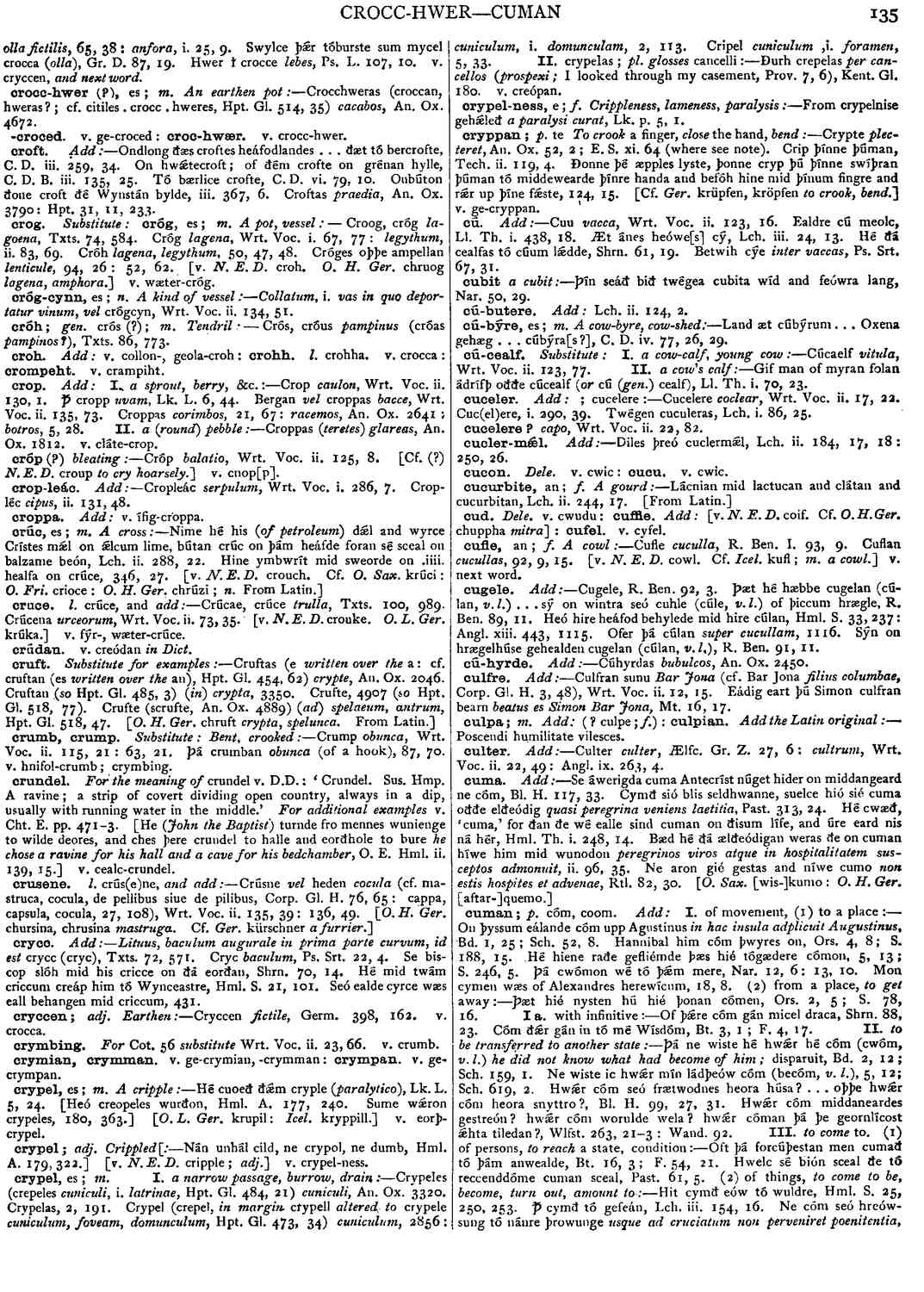cuman
- verb
-
On þyssum eálande cóm upp Agustinus
in hac insula adplicuit Augustinus,
- Bd. 1, 25; Sch. 52, 8.
-
Hannibal him cóm þwyres on,
- Ors. 4, 8; S. 188, 15.
-
Hé hiene raðe gefliémde þæs hié tógædere cómon,
- 5, 13; S. 246, 5.
-
Þá cwómon wé tó þǽm mere,
- Nar. 12, 6: 13, 10.
-
Mon cymen wæs of Alexandres herewícum,
- 18, 8.
-
Þæt hié nysten hú hié þonan cómen,
- Ors. 2, 5; S. 78, 16.
- I a. with infinitive :-- Off
-
Cóm ðǽr gán in tó mé Wísdóm,
- Bt. 3, 1; F. 4, 17.
-
Þá ne wiste hé hwǽr hé cóm (cwóm,
v. l.) he did not know what had become of him;
disparuit,- Bd. 2, 12; Sch. 159, 1.
-
Ne wiste ic hwǽr mín ládþeów cóm (becóm,
v. l.
),- 5, 12; Sch. 619, 2.
-
Hwǽr cóm seó frætwodnes heora húsa? . . . oþþe hwǽr cóm heora snyttro?,
- Bl. H. 99, 27, 31.
-
Hwǽr cóm middaneardes gestreón? hwǽr cóm worulde wela? hwǽr cóman þá þe geornlícost ǽhta tiledan?,
- Wlfst. 263, 21-3: Wand. 92.
-
Oft þá forcúþestan men cumað tó þám anwealde,
- Bt. 16, 3; F. 54, 21.
-
Hwelc sé bión sceal ðe tó reccenddóme cuman sceal,
- Past. 61, 5.
-
Hit cymð eów tó wuldre,
- Hml. S. 25, 250, 253.
-
Ꝥ cymð tó gefeán,
- Lch. iii. 154, 16.
-
Ne cóm seó hreów*-*sung tó nánre þrowunge
usque ad cruciatum non perveniret poenitentia,
- Past. 419, 14.
-
Hit cóm tó þám, . . . þæt hé geceás him leorningcnihtas,
- Wlfst. 17, 9.
-
Þá cóm hit tó wítenne þám eorlum,
- Chr. 1052; P. 177, 13.
-
Ofer*-*sprǽc cymeð of ðǽre oferwiste,
- Past. 313, 10.
-
Hira demm ðe him of ðǽm gestreónum cymð oððe coom (cóm,
v. l.
),- 345, 2.
-
Wilnian æt þám cásere ꝥ hé of þám campdóme cuman móste,
- Hml. S. 31, 100.
-
Of þám cnihtum þe cómon of þám hungre,
- Ælfc. T. Grn. 21, 19.
-
Hilarion wæs úp cymen in Palistina mǽgðe,
- Shrn. 141, 6.
-
Gif se áð forð cume,
- Ll. Th. i. 392, 30.
-
Gif seó lád forð cume . . . gif heó forð ne cume,
- 394, 22, 23.
-
Hit cymð him sáre,
- Ps. Th. 7, 14.
-
Cymen mé mildse ðíne
veniant mihi miserationes tuae,
- Ps. Srt. 118, 77.
-
Hé cwæð hire tó: 'Wel þú cóme; ac cum tó ús on éce reste,
- Shrn. 60, 19.
-
Hé læg bútan andgite. Eft ðá ðá hé cóm, þá hét hé hine ferigan tó Hiericho,
- Hml. Th. i. 86, 27.
-
Hé hine áhsode hwǽr hé his mǽg-cildum cumen hæfde,
- Lch. iii. 426, 1.
-
Þá cóm Gallicanus eác tó Gode gebogen
then Gallicanus also got converted,
- Hml. S. 7, 336.
-
Nim wulle be ne cóm nǽfre áwaxen
take wool which never got washed,
- Lch. iii. 122, 14.
Bosworth, Joseph. “cuman.” In An Anglo-Saxon Dictionary Online, edited by Thomas Northcote Toller, Christ Sean, and Ondřej Tichy. Prague: Faculty of Arts, Charles University, 2014. https://bosworthtoller.com/42221.
Checked: 0